These days, most of us will try any easy pointer to increase our wellness and hike up our immunity. And as it turns out, boosting your immune system doesn’t mean committing yourself to taking an overwhelming handful of supplements every morning.
Your steps for staying well can be simple. Here, an infectious disease doctor at New York University’s Langone Health highlights the everyday ways you can tweak your routine ever so slightly to fight illness and infection. Keep reading—and don’t miss Here’s How Long You Need to Walk to Lower Your Blood Sugar, New Research Finds.
Carve out time to find calm
“Chronic stress can have a negative impact on your immune system,” says Tania Elliott, MD, infectious disease specialist and allergist at NYU Langone in New York City. To help relieve anxiety and tension, pause for two minutes a day to just breathe and focus on the now. “Meditation can definitely help,” she says.

Have a giggle
Another easy way to squash some stress: laugh a little. Finding joy and giggling about it can release neurons that help fight stress and potentially, illnesses, according to the Mayo Clinic.

Sing your way healthy
A study of a German choir revealed that singing activates the spleen, helping to increase the blood concentrations of antibodies and boost the immune system. If group singing isn’t for you, belt out your favorite tunes in the shower—even just listening to music has some great health benefits.

Make room for mushrooms
Scientists have been finding more and more benefits of mushrooms in many areas of health—including your immune system. One study found that shiitake mushrooms improved T-cells and reduced inflammation—both important for keeping you healthy and fending off illness.

Get moving
Another great way to boost your immune system? Get moving. Exercise can change your body’s antibodies and white blood cells, which help you fight off diseases and infections, according to the U.S. National Library of Medicine.
Dr. Elliott suggests incorporating more movement in your day simply by walking around during phone calls and meetings or doing squats while watching TV. Don’t miss these habits that might be harming your immune system.

But get rest, too
Always include plenty of recovery days in your training schedule to preserve immune system health.
Even more importantly, make sure you’re getting enough sleep at night to help your body recover from the mental and physical stress of the day, says Elliott.
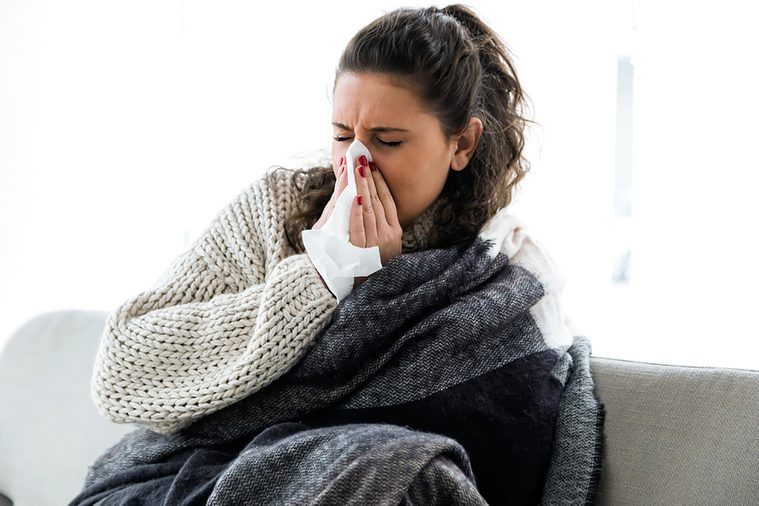
Don’t let yourself freeze
Mom was right: you could catch an infection if you’re cold. Some research suggests that our immune cells don’t fight as strongly against viruses when we’re uncomfortably chilly.
Should You Get Your Covid Vaccine and Flu Shot on the Same Day?
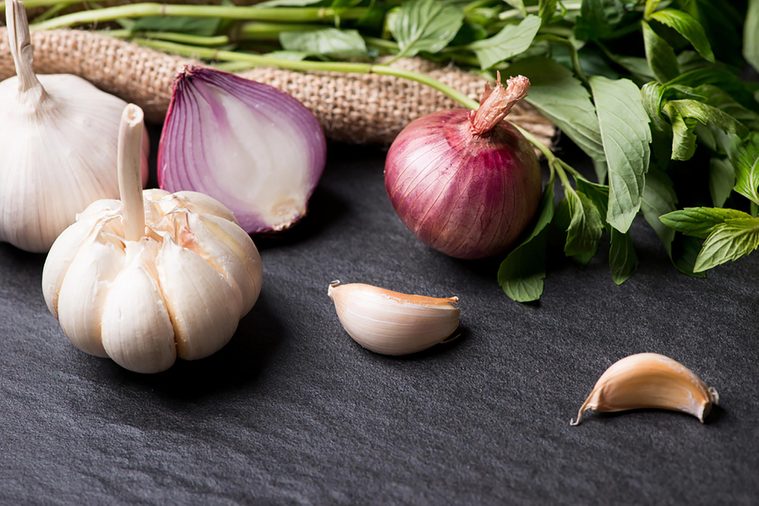
Resist infection with veggies
Garlic and onions in soup, stews, and other dishes are both strong sources of anti-inflammatories and antioxidants, which help battle free radicals and viruses, Dr. Elliott says. Check out this full list of immune-boosting foods.
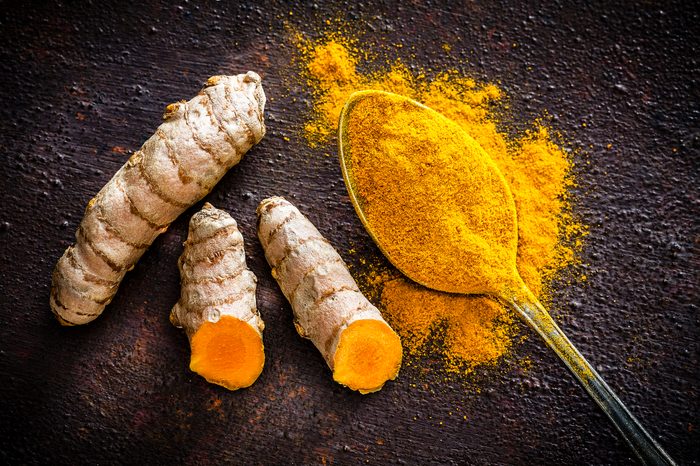
Try turmeric
You’ve probably heard about the health benefits of turmeric, a spice that’s been trending, but has been used in curry dishes for centuries. The reason it’s so great for your wellness is because of its anti-inflammatory and antioxidant properties, providing you with a strong system to fight sickness, says Dr. Elliott. In fact, here are more things that happen when you eat more turmeric.
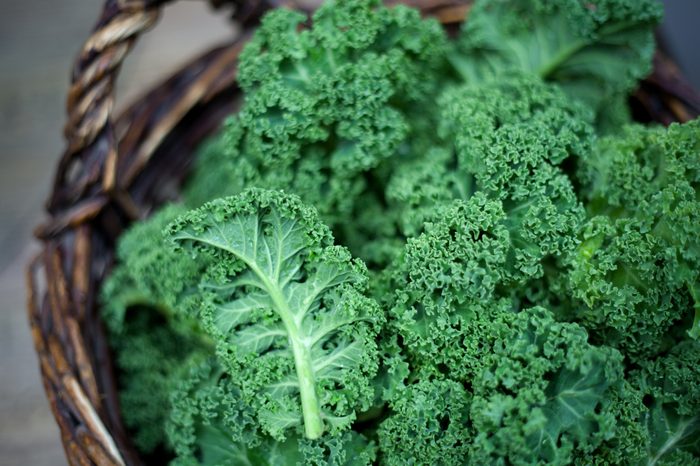
Look for produce high in quercitin
In addition to anti-inflammatory foods and those packed with antioxidants, Elliott suggests trying fruits and veggies that have quercitin. This is a plant pigment, or flavonoid, that boosts the immune system and blocks histamine—the chemical that releases in the setting of allergies and infection, causing redness congestion, and swelling.
Kale, tomatoes, broccoli, raw asparagus, capers, and blueberries all contain high amounts.
Drinking This Beloved Juice Every Day Could Reduce Your Heart Disease Risk
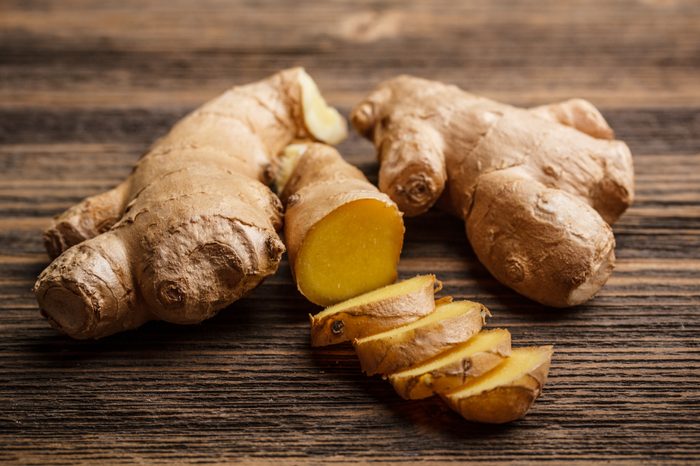
Get some ginger
Ginger is another one of Dr. Elliott’s go-to inflammation-fighting foods. “This is my favorite, because not only can you ingest it, you can also create a humidified treatment with boiling water and fresh ginger for breathing in, which helps decrease inflammation in your lungs and sinuses,” she says.

Avoid alcohol
Of course, there are some things out there that mess with your immune system, too—including alcohol. Dr. Elliott explains the main reason alcohol can mess with your health is because it often also ruins your sleep…and anything that interrupts your sleep also disrupts your immune system.
Also, chronic drinking can suppress the production of certain blood cells, upping the risk of infection. Now, you’ll want to brush up on these 20 tips from people who never get sick.

Keep your allergies in check
If you suffer from seasonal allergies, you may sniffle and sneeze. This can lead to inflammation in your sinuses, which makes it easier for a cold to take hold. To bolster your immune system and fight off sniffles, talk to your doctor on how you can get your allergies under control. In the meantime, here are natural allergy remedies that provide relief.
For more wellness updates, follow The Healthy on Facebook, Instagram, and Twitter. Keep reading:
